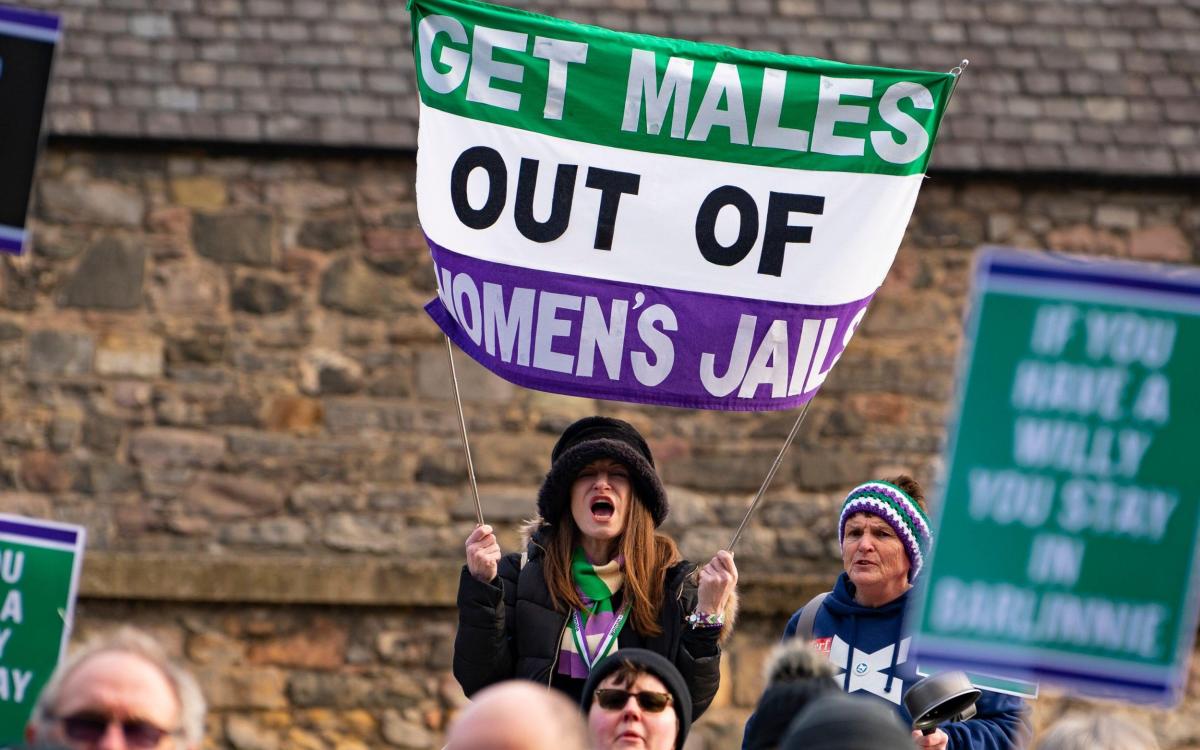Sports
Sunak: I’ll change the Equality Act to protect women’s spaces

Rishi Sunak will on Monday vow to change the law to protect women’s spaces such as toilets and changing rooms.
The Prime Minister will announce that the Conservative manifesto will include a pledge to rewrite the Equality Act to make clear sex means “biological sex”.
This is to ensure that trans women – those who were born male – can be legally barred from places such as women’s prisons and sessions for domestic abuse victims, even if they have a gender recognition certificate.
The new legislation will also make it easier for organisations to prevent biological males from joining female sports teams, or from women’s single-sex wards in hospitals.
The proposals are an attempt to mark a clear dividing line with Labour, which the Tories say is weak on the gender issue.
The Prime Minister said on Sunday: “The safety of women and girls is too important to allow the current confusion around definitions of sex and gender to persist.
“The Conservatives believe that making this change in law will enhance protections in a way that respects the privacy and dignity of everyone in society.
“We are taking an evidence-led approach to this issue so we can continue to build a secure future for everyone across the whole country.”
‘Regulatory bodies are confused’
Kemi Badenoch, the Equalities Minister, said that the plans would end the confusion over the law which had seen biological men allowed access to spaces for women.
She said: “Whether it is rapists being housed in women’s prisons, or instances of men playing in women’s sports where they have an unfair advantage, it is clear that public authorities and regulatory bodies are confused about what the law says on sex and gender and when to act – often for fear of being accused of transphobia, or not being inclusive.
“That is why we are today pledging that, if we form a government after the election, we will clarify that sex in the law means biological sex and not new, redefined meanings of the word.
“The protection of women and girls’ spaces is too important to allow the confusion to continue.”
The announcement comes in the wake of fierce debate over how to protect women’s rights amid demands from activists over the treatment of trans people.
This came to the fore when in Scotland, Nicola Sturgeon tried to pass a law which would have allowed any Scot aged 16 or older to change their legally-recognised sex simply by signing a declaration. The plans were blocked by the UK Government.
Transgender rapist Isla Bryson was initially sent to a women’s prison in Scotland after being jailed in February 2023 for raping two women, crimes that were committed while living as a man known as Adam Graham. Bryson was later moved to a men’s prison.
Law to clarify biological sex
Labour has been criticised for failing to stand up for women and a number of senior figures, including Sir Keir Starmer, have struggled to explain whether or not a woman can have a penis.
The party is also considering allowing a single family GP, rather than two, to sign off on a gender recognition certificate, which allows a person to legally change their gender.
The Tories plan to change the Equality Act to make it absolutely plain that when it talks about the protected characteristic of sex, this means biological sex – and not the gender someone identifies with.
It means that even those who have a gender recognition certificate could be prevented from accessing single-sex spaces, even though the law sees them as legally the gender they identify with.
The new law will also make it clear that issues around gender can only be legislated on by the UK Parliament.
This would prevent the SNP repeating its attempt to bring in self ID for trans people via a vote in the Scottish Parliament.
When the Equality Act was passed in 2010, it was assumed that it did allow organisations to insist spaces were only for biological women, because “sex” is one of the protected characteristics under the law.
But in the intervening 14 years, a growing trans movement has emerged which argued that “sex” should not mean biological sex as originally conceived, but the gender someone identifies with.
Such a definition would mean that it would be against the law to ban biological males from toilets and other single-sex spaces, if the person identified as a woman.
This ambiguity has left single-sex service providers vulnerable to challenge and legal action, which campaigners argue has ultimately put women and girls’ safety at risk.
New law important in sports
Mr Sunak wants to change the law to make it explicit that “sex” in the legislation means “biological sex” and not an identified gender.
The Tories believe that this would ensure single-sex spaces are maintained for women and girls, and that single-sex groups can freely associate without others of the opposite biological sex.
This would, for example, allow lesbian women to meet up and block entry to trans women – biological men – who consider themselves to be lesbians.
Writing for The Telegraph, Lucy Frazer, the Culture Secretary, said the new law would also be of vital importance on the sporting field.
“Biological sex matters,” she said. “This isn’t a ‘culture war’. This is something that many people care about it. It’s about protecting rights where they matter, like they do in sport.
“Transgender athletes, with all the advantages of male puberty, have an undeniable edge over women and girls.”

She added: “Adding clarity to the law will help those who run clubs and who are seeking to give women privacy and safety the support they need, whilst also providing facilities for others who need them.
“The integrity and safety of women’s sport will be guaranteed by this crystal-clear law change. We have spent decades fighting for equality and fairness. Let’s not stop now.”
Reacting to the Prime Minister’s announcement, Maya Forstater of the group Sex Matters said on Sunday: “The next government must move quickly to fix the law so that it works for women and girls. Polling shows that most people support genuinely single-sex provision, and fixing the Equality Act also features in Mumsnet’s election manifesto – in essence, the nation’s biggest doorstep.
“All parties should stop playing political football with women’s rights. Politicians should be in no doubt that women will hold those who fail to protect those rights to account. We are asking every party to stand up for single sex services.”
Gender recognition ‘a reserved matter’
Last year Ms Badenoch wrote to the Equality and Human Rights Commission seeking further guidance on how to protect same-sex spaces.
In reply, the EHRC said it would bring greater legal clarity for “sex” to be defined as biological sex for the purposes of the Equality Act.
The new law will also make plain for the first time that gender recognition laws should only be passed by the UK Parliament, and not by devolved assemblies such as the Scottish Parliament.
“We are one United Kingdom and it has become apparent that it is impractical for gender recognition regimes to vary in different parts of the country,” a government spokesman said.
“Therefore, we will also establish in law that gender recognition is a reserved matter. This will mean that an individual can only have one sex in the eyes of the law in the United Kingdom.”
One of the consequences of the proposed change would be that Ms Sturgeon’s gender self-ID law, which was blocked by the UK Government, would automatically be sent for Royal Assent to become law.
This is because the arguments UK ministers relied upon in court to justify the veto, which centred around the UK-wide Equality Act, would no longer be valid.
However, to prevent the plans, and any similar future proposals, from becoming law, the Tories are proposing to amend the devolution settlement to reserve powers over gender to Westminster.
The plan to revoke powers from Holyrood will likely cause a major row with the SNP, who are likely to brand it an attack on devolution.
However, the Tories could see a row with the SNP over the gender Bill as politically advantageous, given that the self-ID law is unpopular with voters.
We’ll add clarity to the law to protect women and girls
By Lucy Frazer
Biological sex matters. Sadly, this has become a contested area of the law and as a result, too often inaccurate guidance is shared creating confusion and anger.
That’s why it is important to be clear about the definition of sex. Furthermore, failure to deal with this issue is not protecting women and girls. Getting the law right will ensure there is a level playing field and protect our women’s and girls’ rights to privacy.
This isn’t a “culture war”. This is something that many people care about it. It’s about protecting rights where they matter, like they do in sport.
I have previously called for sporting bodies to take an unambiguous position on transgender participation in competitive sport. Transgender athletes, with all the advantages of male puberty, have an undeniable edge over women and girls.
With bigger, stronger muscles, typically biological men can run faster, jump higher and endure physical strain for longer. We know that no amount of testosterone suppression can ever mitigate these inbuilt advantages.
It’s common sense and cannot be ignored.
But despite these clear, scientific facts, the debate has become increasingly toxic and many people find it hard to speak up. They feel silenced. But it is right that we speak and it’s right that we take action, to protect women and girls. The current position needed to change.
Sporting bodies have not been going far or fast enough to protect women and girls. That is why it is so important for the Government to add this legal clarity. It will provide legal cover for those who want to provide single-sex spaces and activities but currently don’t feel able to under the Equality Act.
For our girls and young women who hope of one day being elite sportswomen, this will give them the confidence they need to pursue their dreams without the anxiety that seeing male-born athletes fill podium place after podium place can bring.
And this sensible change will ensure that women and girls have the facilities they need. Facilities like changing rooms and toilets that are essential for women’s privacy, dignity and safety. Without these spaces being single sex, many women and girls would rightly not feel comfortable joining in.
Adding clarity to the law will help those who run clubs and who are seeking to give women privacy and safety the support they need, whilst also providing facilities for others who need them.
The integrity and safety of women’s sport will be guaranteed by this crystal-clear law change. We have spent decades fighting for equality and fairness. Let’s not stop now.
Lucy Frazer is the Secretary of State for Culture, Media and Sport






